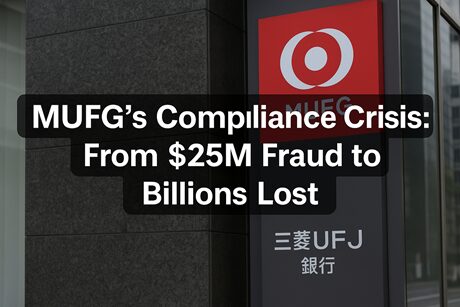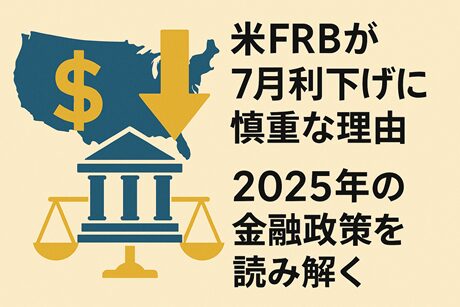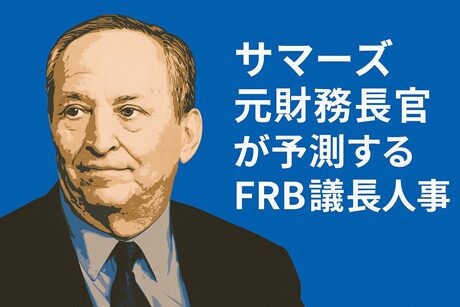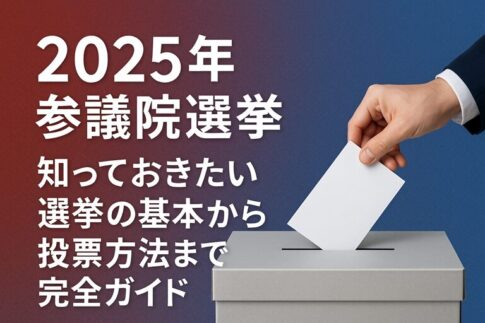目次
- 1 MUFG’s Compliance Crisis: From $25M Fraud to Billions Lost
- 1.1 A Comprehensive Timeline of MUFG Bank Scandals
- 1.1.1 1. Niigata Branch Employee’s Fictitious Product Fraud (Disclosed June 2025)
- 1.1.2 2. Massive Safe Deposit Box Theft (Disclosed November 2024)
- 1.1.3 3. Systematic Violations in Banking-Securities Collaboration (Sanctioned June 2024)
- 1.1.4 4. Mitsubishi UFJ Securities Customer Information Leak (2009)
- 1.1.5 5. Violations and Internal Control Deficiencies in Overseas Operations (2007)
- 1.1.6 6. Inappropriate Practices in Investment Trust Sales (2007)
- 1.1.7 7. Criminal Charges and Administrative Sanctions Against Former UFJ Bank (2004)
- 1.2 Corporate Culture and Environment Enabling Repeated Scandals
- 1.3 Weaknesses in Japan’s “Three Lines of Defense”
- 1.4 Structural Challenges and Future of the Financial Industry
- 1.5 Reform Directions for Preventing Recurrence
- 1.6 The Importance of “Passing Down” Scandal Lessons
- 1.7 MUFG’s Scale and Social Responsibility
- 1.8 Conclusion: The Path to Restoring Trust in Financial Institutions
- 1.9 Related Articles
- 1.10 References
- 1.1 A Comprehensive Timeline of MUFG Bank Scandals
MUFG’s Compliance Crisis: From $25M Fraud to Billions Lost
On June 23, 2025, Mitsubishi UFJ Bank disclosed yet another scandal involving a former employee who defrauded customers of approximately $25 million (¥3.98 billion). This latest revelation is merely the tip of the iceberg for Japan’s largest financial group, Mitsubishi UFJ Financial Group (MUFG), which has been plagued by a series of major scandals including safe deposit box thefts totaling billions of dollars and systematic violations of banking-securities firewall regulations. Despite positioning compliance as a “top management priority,” why do these scandals continue to emerge? The answer lies in deep-rooted structural problems within Japan’s financial industry.
A Comprehensive Timeline of MUFG Bank Scandals
1. Niigata Branch Employee’s Fictitious Product Fraud (Disclosed June 2025)
The most recent scandal involves a retired male employee from the Niigata branch who defrauded a single customer over a nine-year period from June 2007 to September 2016, stealing approximately $25.4 million (¥3,984,676,900).
Case Details:
- The former employee issued forged deposit certificates in July 2020, making them appear as legitimate financial products
- The embezzled funds were used for entertainment expenses and debt repayment
- He misused branch seals that only managers were authorized to use, taking advantage of busy periods when managers left their desks unattended
- When discovered in August 2024, the employee had already retired and the statute of limitations for fraud had expired
- The bank filed criminal charges on November 28, 2024, and the former employee was indicted for forgery and use of private documents on June 23, 2025
Key Issues: The case was discovered in August 2024 through customer inquiries, but disclosure was delayed by approximately 10 months. Despite the bank being aware of this case when announcing the safe deposit box theft in November 2024, they chose not to disclose it simultaneously, citing concerns about “interfering with the investigation.” This delay has been criticized as a lack of transparency.
2. Massive Safe Deposit Box Theft (Disclosed November 2024)
The financial industry was shocked by the safe deposit box theft case at the Nerima branch (including the former Ekoda branch) and Tamagawa branch. A former branch operations manager (female employee in her late 40s) stole items from customers’ safe deposit boxes over approximately 4.5 years from April 2020 to October 2024.
Scale and Method:
- Victims: Approximately 60 customers
- Total damage: Several billion dollars at market value (over ¥1 billion)
- Period: Approximately 4.5 years (April 2020 – October 2024)
- Method: Abused her position to access the cabinet containing spare keys for safe deposit boxes
- Spare keys were supposed to be stored in special envelopes sealed with stamps from both the customer and bank manager, but the employee had authority to open the cabinet as branch operations manager
Analysis through the “Fraud Triangle”:
- Opportunity: Ambiguous spare key management, lack of verification rules, position as deputy branch manager responsible for oversight
- Motivation: Need to cover investment losses
- Rationalization: Low profitability of safe deposit box services, belief that she could “return it later”
MUFG President Junichi Hanzawa admitted at a press conference that “there had been no previous incidents with safe deposit boxes, so risk awareness was low,” acknowledging weaknesses in management systems. Following this incident, the Japanese Bankers Association revised its rules to prohibit cash storage in safe deposit boxes.
Delayed Disclosure and Criticism: The approximately one-month gap between discovery and the press conference raised suspicions of a cover-up. Furthermore, major media outlets’ failure to report the former employee’s real name and photo led to speculation about deference to MUFG as a major advertising sponsor and authorities’ concerns about preventing a bank run.
3. Systematic Violations in Banking-Securities Collaboration (Sanctioned June 2024)
On June 24, 2024, Japan’s Financial Services Agency (FSA) issued business improvement orders to Mitsubishi UFJ Bank, Mitsubishi UFJ Morgan Stanley Securities, and Morgan Stanley MUFG Securities for serious violations of “firewall regulations” that restrict information sharing between banks and securities companies.
Major Violations:
- Information sharing despite clear customer refusal: Despite repeated refusals from corporate clients to share non-public information (such as plans to sell cross-held shares), a then-Executive Managing Director of the bank provided this information to affiliated securities companies, which used it for underwriting solicitations
- Abuse of dominant position: The bank engaged in “tie-in sales” by negotiating to give affiliated securities companies corporate bond underwriting shares in exchange for favorable loan terms
- Conducting unauthorized securities business: The bank engaged in solicitation and negotiation for stock and bond underwriting, which are securities-related businesses not permitted for banks
Management Involvement:
- The then-Executive Managing Director of Mitsubishi UFJ Bank conveyed information to the Deputy President of Mitsubishi UFJ Morgan Stanley Securities, which was then shared internally and used for solicitations
- The then-Representative Director of the bank, despite recognizing the possibility of inappropriate information sharing, failed to conduct detailed fact-checking or contact the compliance department after receiving a report from subordinates that “tacit approval had been established”
Sanctions and Accountability: The Japan Securities Dealers Association also imposed administrative monetary penalties of $1.6 million (¥250 million) on Mitsubishi UFJ Bank and $1.3 million (¥200 million) on Mitsubishi UFJ Morgan Stanley Securities. Executive compensation was reduced, with the Chairman of the Board, President and CEO, and Managing Executive Officers of Mitsubishi UFJ Bank receiving cuts. MUFG Chairman Kanetsugu Mike (then President of Mitsubishi UFJ Bank), who failed to take measures despite recognizing the possibility of inappropriate information sharing, received the heaviest penalty: a 30% reduction in monthly compensation for five months.
4. Mitsubishi UFJ Securities Customer Information Leak (2009)
A male employee who was Deputy General Manager of the Systems Department at Mitsubishi UFJ Securities (at the time) illegally extracted customer information and sold it to list brokers.
Case Details:
- The leaked customer information was resold to at least 98 companies
- Information could only be recovered from 28 companies, with leaked data flowing to real estate companies and futures trading firms who made aggressive solicitations
- Motive: To repay debts exceeding $3,200 (¥500,000) incurred from frequenting hostess clubs
- Mitsubishi UFJ Securities claimed damages exceeding $450 million (¥70 billion)
- The emergency hotline received over 16,000 complaints
Root Cause: Lax information management systems were to blame. Concentration of access privileges among certain employees and failure to delete IDs of colleagues who had transferred to other departments allowed easy unauthorized access. The FSA issued a business improvement order citing inadequate internal management systems.
5. Violations and Internal Control Deficiencies in Overseas Operations (2007)
In 2007, the FSA issued a business improvement order to Mitsubishi Tokyo UFJ Bank (at the time) after multiple overseas offices were cited by local supervisory authorities for legal violations and internal control deficiencies.
Particularly Serious Issues:
- New York branch and U.S. trust subsidiary: Cited for serious deficiencies in anti-money laundering systems, receiving business improvement orders in December 2006
- U.S. banking subsidiary: Had received similar orders in 2004
- The FSA noted at the time that “Mitsubishi Tokyo UFJ Bank has significantly more problems compared to other megabanks”
6. Inappropriate Practices in Investment Trust Sales (2007)
Issues identified in Mitsubishi Tokyo UFJ Bank’s investment trust sales included:
- Practices violating the duty of good faith to customers
- Some branches prioritizing “performance over appropriate customer service”
- Failure to carry over similar incident prevention measures from former UFJ Bank to the new bank
- Inadequate headquarters systems and insufficient management involvement
7. Criminal Charges and Administrative Sanctions Against Former UFJ Bank (2004)
UFJ Bank, MUFG’s predecessor, and several related parties were criminally charged for violating the Banking Act by obstructing FSA inspections. UFJ Bank received administrative sanctions temporarily suspending new lending to corporate clients in certain divisions. This incident, linked to Ministry of Finance entertainment scandals from 1997-98, exemplified UFJ’s failure to break from its past.
Corporate Culture and Environment Enabling Repeated Scandals
1. Fundamental Problems with Compliance Awareness and Management Systems
While MUFG positions compliance as a “top management priority” and has established internal control systems, the reality is starkly different.
Superficial Compliance Systems:
- Insufficient penetration of proper legal understanding and compliance awareness
- Inadequate monitoring systems
- Internal regulations and training materials overly focused on detailed knowledge and rules, neglecting fundamental understanding of “why” regulations exist
- Compliance described as rigid with “somewhat stiff” culture and “deep-rooted stamp culture requiring three levels of checks”
Management Issues:
- In past UFJ Bank scandals, management was aware of problems but failed to take concrete action for years
- Mutual oversight functions were not working
- Inadequate transfer of regulations during mergers
2. Excessive Performance Pressure and “Demerit System” Culture
The banking industry’s unique “demerit system” culture creates a breeding ground for misconduct.
Frontline Reality:
- Sales quotas become “heavy pressure” and a reason for resignation
- Culture where failing to meet quotas results in “marks against you”
- In inappropriate investment trust sales cases, some branches “prioritized performance over appropriate customer service”
- Amid demands for operational efficiency, process shortcuts and simplification lead to prioritizing efficiency over compliance awareness
3. Deep-Rooted Issues with Organizational Culture and Human Resources
Harmful Effects of Top-Down and Silo Mentality:
- Strong “top-down” tendency making it difficult for frontline voices to be heard
- Culture perceived as having an “old constitution”
- Strong departmental “silos” with weak horizontal connections
- “Distorted corporate culture of blind obedience and deference to management” impeding rational judgment at the frontline
Declining Quality of Human Resources:
- Prolonged low interest rate environment making it harder to attract top talent
- Mass retirement of veteran employees leading to declining workforce quality
- Heavy reliance on proprietary banking systems and software, limiting transferable skills
The Existence of “Bystanders”:
- Those who know about misconduct but remain silent due to “inability to oppose superiors” or “fear of unfavorable transfers”
- Impersonal decision-making and execution of misconduct through organizational integration
4. Management Recognition and Response Issues
Post-Scandal Management Attitudes:
- After scandals, new management shows attitude of “not wanting to hear about past misconduct”
- Employees respond by “not telling them,” leading to information concealment and suppressed reporting
- Management only hears “pleasant things,” allowing problems to grow
Delayed and Opaque Information Disclosure:
- Criticism over delayed disclosure of safe deposit box theft
- Reports that management initially wanted to avoid press conferences
- Views that “the bank is also a victim” and management wanted to avoid media scrutiny over individual employee misconduct
- Speculation that media deferred to MUFG as a major advertising sponsor by not reporting former employees’ real names and photos
Weaknesses in Japan’s “Three Lines of Defense”
Compared to global standards, Japan’s “Three Lines of Defense” model (mutual checks between business units, risk management, and internal audit) has significant weaknesses.
Shallow Conceptual Understanding:
- “Three Lines of Defense” understood superficially as “checking three times reduces errors”
- The true purpose of independent roles, responsibilities, and mutual checks among risk management, compliance, and internal audit functions is not well understood
Management Control Over All Lines and Lack of Independence:
- In Japanese companies, management sits atop all three lines (business, risk management, internal audit), an “extremely rare governance structure” internationally
- Management has difficulty obtaining objective evaluation of their decisions, and unfavorable information is hard to communicate
- Internal audit departments report directly to the president
- Audit committee chairs and standing auditors are often former subordinates of the president
- Few specialists in internal audit departments, with staff rotating back to business units or retiring after 2-3 years
Lack of Independent Oversight:
- International standards have internal audit departments report directly to the board/audit committee, with the audit committee holding authority over internal audit planning, budgets, department head appointments/dismissals, and performance evaluations
- In Japan, audit functions are not independent from management, preventing healthy checks and balances
- Toshiba example: Audit committee chair was president’s former subordinate involved in past accounting fraud; internal audit department knew of accounting fraud but participated in cover-up
Structural Challenges and Future of the Financial Industry
Between Banking-Securities Integration and Deregulation
As negative interest rate policies drastically reduced banks’ main revenue source of loan interest, the banking industry has sought deregulation similar to other countries to provide comprehensive financial services to customers. However, recent scandals have highlighted distortions in this process.
Current Deregulation Status and Challenges:
- “Prohibition on dual registration of securities salespeople”
- “Cross-marketing regulations for issuers”
- “Information exchange regulations” for individuals and SMEs
While deregulation would increase customer convenience by allowing them to receive securities product proposals and after-sales service from familiar bank representatives, it also increases risks of abuse of dominant position as seen in recent cases.
Pros and Cons of Financial Conglomeration
Advantages:
- Risk diversification through broad financial service offerings
- Customer base maintenance and expansion
- Cost synergy effects
- Development and provision of innovative products
Disadvantages:
- Difficulty managing risks due to business complexity
- Risk of customer harm through tie-in sales
Reform Directions for Preventing Recurrence
Following administrative sanctions, MUFG claims to be advancing the following reforms:
1. Strengthening Management and Governance Systems
- Enhanced executive training (firewall regulations, business laws, compliance pledges)
- Practical training using external experts, discussions, role-playing
- Establishment of crisis management headquarters (led by holding company president, bank president, securities company presidents)
- Management-led improvement measure development and progress monitoring
2. Strengthening Internal Control Systems
- Review and enforcement of procedures and rules
- Strengthening organizational structure, advisory functions, and monitoring systems according to business risks
- Priority allocation of additional resources including personnel and systems
- Stronger penalties for legal violations
- Expanded compliance committee scope
3. Customer Protection and “Customer-First Business Operations”
- Clear information provision (especially for elderly and inexperienced investors)
- Improved fee transparency (introduction of “Key Information Sheets”)
- Use of digital tools (tablet simulations)
- Expertise-based service (complex products explained only by highly skilled staff)
- Appropriate customer information management
4. Culture Reform
- “Culture reform” aimed at creating a company where employees think and act independently
- Fostering a culture of “challenge and speed”
- Internal job postings and specialized career tracks
- Active recruitment of approximately 500 mid-career hires annually for diversity
The Importance of “Passing Down” Scandal Lessons
For organizations that have experienced scandals to improve sustainably, it’s crucial to “pass down” lessons from past misconduct.
Addressing Generational Awareness Gaps:
- Coexistence of generations that experienced scandals and those that didn’t
- What should experienced generations pass down, and how should inexperienced ones interpret it?
The Dual Nature of Scandals:
- Negative aspect of denying and criticizing the past
- Positive aspect of moving forward toward corporate renewal
Utilizing Storytelling:
- Applying positive storytelling techniques
- Conveying organizational messages through negative experiences of scandals
- Finding solutions for corporate renewal and prevention, not just investigating causes
Emphasis on Frontline Operations:
- Management must consistently show strict stance that “scandals will not be tolerated”
- Review daily communication between supervisors and subordinates, recording all customer complaints and troubles
- Create healthy tension within branches to nip problems in the bud
MUFG’s Scale and Social Responsibility
MUFG is Japan’s largest financial group with consolidated total assets of approximately $2.6 trillion (¥404 trillion as of March 2024), ranking first in net profit among domestic financial groups and second overall in Japan after Toyota Motor Corporation. It ranks 9th among the world’s top 50 banks.
However, due to its scale and influence, the social impact of its scandals is immeasurable. While proclaiming its purpose as “Empowering a brighter future,” repeated scandals reveal a significant gap between this ideal and reality.
Mitsubishi UFJ Bank’s Characteristics:
- Only Japanese bank using Disney characters as mascots
- Employee sentiment: “Japan’s number one bank – if this company fails, Japan fails. That level of security”
- Positive evaluations of high organizational cohesion and capable leadership
However, such “security” and “cohesion” may sometimes create an environment that overlooks problems.
Conclusion: The Path to Restoring Trust in Financial Institutions
Scandals at financial institutions clearly stem not from individual problems but from complex factors including management governance, organizational culture, and weak internal control systems. In the trust-based financial industry, these scandals directly damage brand image and profitability, making prevention a top priority.
Requirements for True Prevention:
- Management must properly recognize risks and proactively promote risk management and compliance
- Continuous, effective training for executives and employees
- Strengthen independence and oversight functions of risk management and internal audit departments
- Ensure effectiveness of internal reporting systems and foster psychologically safe organizational culture where employees can report problems confidently
- Thoroughly implement customer-first business operations with transparent information provision and sincere service
By learning from past scandals, sharing experiences organization-wide, and transforming corporate culture through continuous improvement, financial institutions can restore public trust and achieve sustainable growth.
Mitsubishi UFJ Bank and the MUFG Group, as Japan’s largest financial group, bear responsibility as industry leaders. Rather than superficial measures or temporary improvements, they must commit to fundamental organizational culture transformation to truly realize their vision of “Empowering a brighter future.”
Related Articles
Detailed Analysis of MUFG Bank’s Outside Director Proposal
References
- Mitsubishi UFJ Financial Group
- Mitsubishi UFJ Bank
- Financial Services Agency
- Japanese Bankers Association
- Sumitomo Mitsui Trust Bank
- Mizuho Financial Group
- Bank of Japan
- Cabinet Office
- Consumer Affairs Agency















Leave a Reply